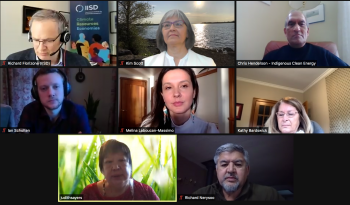Summary
Local Journalism Initiative Reporter
Windspeaker.com
Kim Scott, a co-chair of the Indigenous Clean Energy Social Enterprise, believes it's extremely important to get the message out that Indigenous people are among those leading the pack with clean energy initiatives.
Scott was one of the individuals participating in a presentation during the final day of the Indigenous Clean Energy E-Gathering this past Friday.
“This is a good news story about climate leadership where Indigenous peoples are leading well ahead of Canadian municipalities and it needs to be shared at every kitchen table, with every barista, with every cabbie, with every Canadian,” Scott said. “This is how we change our status in Canada.”
The presentation Scott was a part of featured seven panelists who discussed how climate change action needs to respect Indigenous rights and be inclusive of Indigenous leadership.
Scott is also the principal for Kishk Anaquot Health Research, which has been in existence since 1994 and provides advice to clients, communities and universities about human service, governance and community development issues.
Scott said it’s important to also publicly acknowledge those supporting these Indigenous-led clean energy efforts.
“There’s a huge opportunity I think in making sure that we amplify the change and language around how our partners are supporting us,” she said.
“The provincial and territorial governments are not all on the same level playing field. There is the good, the bad and the ugly in terms of supporting Indigenous clean energy initiatives or energy efficiency initiatives. I’d love to see a report card of who’s doing what and who is doing it well.”
Chris Henderson, the executive director of Indigenous Clean Energy, has been working on climate action projects since 1988.
“We have to take action to ensure we leave the planet better than we received it,” he said. “And we’re not on the path we need to be. That can motivate me in a deep way. It gives me motivation. It gives me power. It gives me the ability to get over the challenges we face. And we need all of us to do that.”
Richard Nerysoo, a former premier of the Northwest Territories, also took part in Friday’s conversation and praised current Indigenous efforts with clean energy programs.
“In my view, right now, Indigenous communities (and) leaders are in fact leading this process in Canada,” he said. “But we have stumbling blocks that are in our way to not only lead Canada but to be the example for the rest of the world for Indigenous people.”
Nerysoo said governments need to change the way they deal with Indigenous people before additional progress is made.
“We have really excellent leadership in this country when it comes to the idea of developing proposals, ideas, concepts or Indigenous people to address climate change or energy efficiency,” he said.
“What we don’t have is policy and the legislative changes that are necessary to allow us to get on our way and do the things we need to do. There are too many restrictions, too many roadblocks, all coming from the idea of monopolies, bad policy or no policy that encourage and support Indigenous initiatives, whether it’s energy efficiency, whether or not it’s renewable development projects. All of those things that cause us issues around moving forward.”
Judith Sayers, the president of the Nuu-chah-nulth Tribal Council in British Columbia, has been a clean energy advocate for decades and she plans to continue in that role.
“There’s been many, many climate changes,” Sayers said. “Just watching it concerns me and it drives me to ensure that I will be able to say to my grandchildren ‘yes, we can still fish, yes, there are still orcas in the water, yes, we still have old growth forests’. And it’s that effort to maintain what we have that drives me.”
Sayers said it’s only natural having a desire to see clean energy programs come to fruition.
“That’s rooted in our values as Nuu-chah-nulth people,” she said. “That it is our responsibility, it is our duty, it is our stewardship that we have to follow. I would not be doing my ancestors any justice if I was to ignore what’s right in front of me.”
Sayers also said time is of the essence when it comes to the work that needs to be done.
“We need to act yesterday,” she said. “And we need to let everybody in this world know that. And so what motivates me is trying to be that voice that we can join in and save this planet, save our lives.
Richard Florizone, the president and CEO of the International Institute for Sustainable Development, said a massive amount of money is required to move forward.
“We need a $500 million investment in national Indigenous clean energy action platforms,” said Florizone, who last year chaired the Task Force For A Resilient Recovery, a collection of industry and First Nations voices, think tanks and others giving the Canadian government advice on how to have a robust recovery from the pandemic.
“We need financing for microgrid systems, for off-grid diesel reduction, for community energy planning and for energy efficiency infrastructure.”
Also participating in the presentation were Ian Scholten, Indigenous Clean Energy’s director of programs, and Kathy Bardswick, president of Climate Choices.
Melina Laboucan-Massimo, the executive director of Sacred Earth Solar, moderated the presentation.
Local Journalism Initiative Reporters are supported by a financial contribution made by the Government of Canada.

